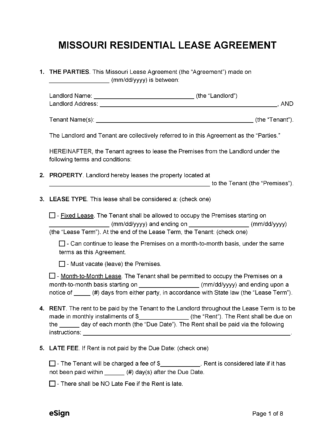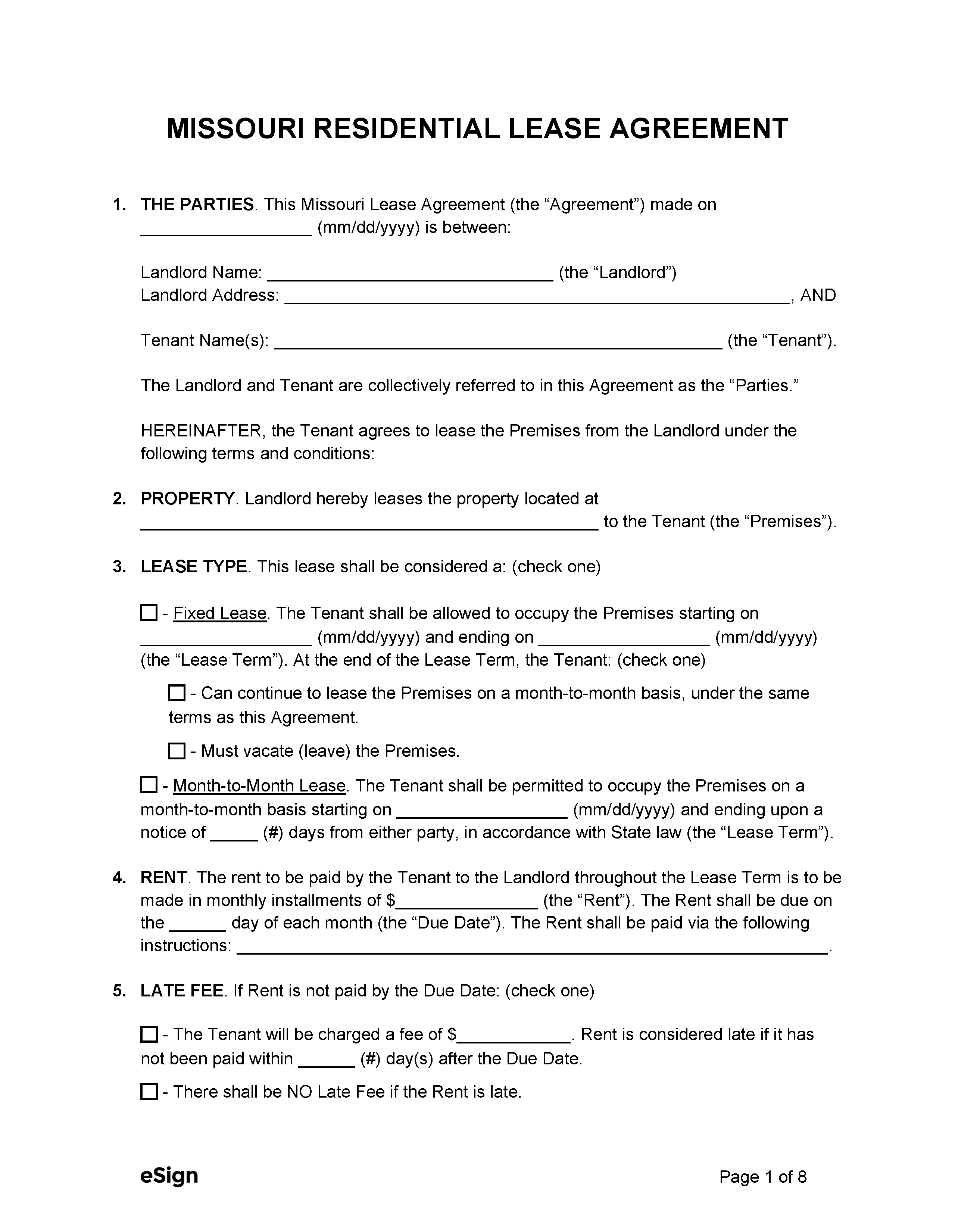
A Missouri lease agreement is a real estate document that lays out the conditions of renting property. The document defines the lease term, rent price, causes for termination, and other details regarding the landlord and tenant’s relationship. Leases are legally binding once signed, meaning both parties will be locked into the rental agreement until the contract expires.
A Missouri lease agreement is a real estate document that lays out the conditions of renting property. The document defines the lease term, rent price, causes for termination, and other details regarding the landlord and tenant’s relationship. Leases are legally binding once signed, meaning both parties will be locked into the rental agreement until the contract expires.
PDF Download
A Missouri lease agreement is a real estate document that lays out the conditions of renting property. The document defines the lease term, rent price, causes for termination, and other details regarding the landlord and tenant’s relationship. Leases are legally binding once signed, meaning both parties will be locked into the rental agreement until the contract expires.
4.7 | 101 Ratings Downloads: 12,004
Rental Application – This document gathers information about prospective tenants to help landlords select the ideal candidate.
Maximum Amount ($) – Landlords cannot request or accept a security deposit greater than two months’ rent. [4]
Collecting Interest – The landlord can keep any interest earned from the security deposit. [5]
Returning to Tenant – The landlord has 30 days to return the security deposit to the tenant after their lease terminates. [6]
Itemized List Required? – Yes, an itemized list of deposit deductions must be provided to the tenant within 30 days after the tenancy terminates. [7]
Separate Bank Account? – No, a separate account is not required; however, security deposits must be held in a financial institution insured by a federal agency. [8]
General Access – State law does not define requirements for entering a rental unit. However, unless the lease specifies otherwise, it is recommended that landlords provide at least 24 hours’ notice of their intention to enter.
Immediate Access – There are no laws regarding immediate access in Missouri. Generally, landlords can enter without notice if there’s an emergency on the premises.
Grace Period – Missouri’s landlord-tenant laws do not provide a grace period for rent, allowing the landlord to impose late fees immediately after the rent is overdue.
Maximum Late Fee ($) – Missouri has no laws limiting how much landlords can charge for late rent.
Bad Check (NSF) Fee – Landlords can apply a $25 fee if the tenant issues a check with insufficient funds. [9]
Withholding Rent – If there’s an issue affecting the property’s habitability, sanitation, or security, and the landlord doesn’t fix the problem within 14 days of receiving notice (or sooner if necessary), the tenant can arrange for the repairs and deduct the expenses from their rent. [10]
Non-Payment of Rent – A verbal or written notice may be issued as soon as rent is overdue. The landlord can break the lease if the tenant doesn’t pay immediately after receiving notice. [11]
Non-Compliance – Tenants in violation of the rental terms are entitled to a 10-day notice before the landlord can break the lease. [12]
Lockouts – Except in cases of property abandonment, a court order is required to prevent a tenant from entering the rental unit. [13]
Leaving Before the End Date – If the tenant breaks the lease by moving out early, they’ll still be responsible for rent payments.
Month-to-Month Tenancy – Termination of month-to-month tenancy can be accomplished with a 1-month notice notice to quit. [15]
Unclaimed Property – If rent goes unpaid for 30 days and the landlord suspects that the unit has been abandoned, they must provide written notice to the tenant. The tenant’s property may be disposed of if they fail to pay or respond to the notice within 10 days. [16]